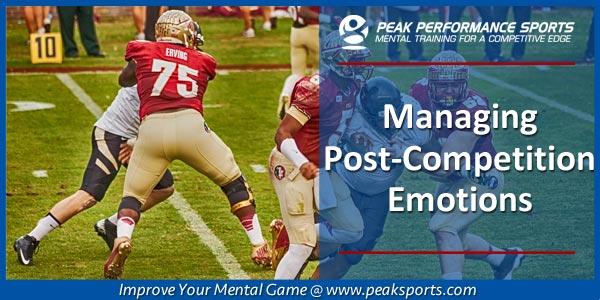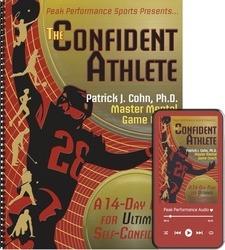
How Do You Handle Your Emotions?
To succeed in sports, athletes must handle their emotions. During the competitive season, every athlete will experience emotional ups and downs.
Dealing with negative emotions may be the most difficult task any athlete faces.
How you deal with emotion will greatly impact your ability to learn, grow confidence, and prepare for the next competition.
For example, if you get caught up in the jubilation of victory, you may feel like “I arrived” and not prepare with the same degree of focus and effort…
You may become too complacent in practice and lose that edge that drives you through the daily grind.
If you sink down in the dumps after a loss, you will not learn from the loss and your levels of confidence, enthusiasm and motivation will suffer.
Athletes that succeed on a consistent basis learn to balance their emotions, especially when responding to defeat.
Successful athletes experience the same intense emotions that you experience, but these athletes are able to put the competition in perspective in a relatively short amount of time.
Successful athletes who can manage their post-game emotions do two things that separate themselves from average athletes:
- After a victory, elite athletes get back to work.
- After a loss, elite athletes get back to work.
Rather than getting tossed around by their emotions, elite athletes focus on working and improving their game.
Tampa Bay Buccaneer Head Coach Lovie Smith has an amazing ability to keep an even keel. Smith began coaching football in 1980 and has been a head coach in the NFL for the last 11 years.
Smith is trying to turn around the Tampa Bay Buccaneers who haven’t had a winning record since 2010. The Tampa Bay Buccaneers are heading into the 2015 NFL season with a lot of promise but also a lot of questions.
The Bucs are a young team with quarterback Jameis Winston, #1 overall draft pick, at the helm on the offense. During the first three preseason games, the Bucs are 1-2 with the last game being a 31-7 loss to the Cleveland Browns.
Despite the poor results in preseason, Smith has managed to keep the season in perspective and emotionally stay in that middle ground.
SMITH: “You’d like to maintain a certain level each week, but normally it doesn’t happen like that. That’s why you can’t get too high after last Monday night’s game and you can’t get too low. We’re somewhere in the middle, that’s where we are right now.”
Smith’s answer provides great advice for athletes and the importance of emotionally staying in that middle ground.
Now the middle ground doesn’t imply that you are not attempting to excel in competitions or that you are okay with bad performances. The middle ground is NOT settling for average.
The middle ground is the emotional processing plant for competitions that helps you evaluate performances objectively.
The middle ground allows you to celebrate successes, learn from losses and know, that no matter what, tomorrow is a new day.
The middle ground allows athletes to gain their bearing and get back to work for the next opportunity in the near future.
Tip for managing post-competition emotions:
Understand you will have good days and bad days in your career. Allow yourself some time after the competition (1 hour) to feel the post-competition emotions. This hour break will allow the intensity of your emotions to subside slightly and gain some perspective.
Afterwards, tell yourself, “Tomorrow is a new day… What do I need to do to sharpen my game?” Then… GET TO WORK!
Check out our video of the week, How To Boost Your Confidence In Sports and the confidence roller coaster.
Related Sports Psychology Articles
- How Your Emotions Affect Your Team’s Mood
- Managing Your Emotions When Adversity Hits
- How Athletes Can Control Emotions
*Subscribe to The Sports Psychology Podcast on iTunes
*Subscribe to The Sports Psychology Podcast on Spotify
Download a free sports psychology report to improve your mental game!
Learn more about our one-on-one mental game coaching.
The Confident Athlete

“The Confident Athlete” consists of 2 audio programs that include 14 days of confidence fueling exercises and a simple to follow workbook that guides you through the 14 days, helps you apply the strategies, and customizes the exercises to your personal needs.
Let me help you put a stop to the confidence leak. You can learn to have greater levels of confidence in competition than you do in practice by identifying the specific ways you undermine your own confidence and how to convert your practice confidence into COMPETITIVE CONFIDENCE.
“The Confident Athlete” is a ground-breaking system to teach you how to think like a champion and have ultimate self-confidence every time you step on the playing field, court, track, or course. The confident athletes was developed for any athlete – junior to professional –that wants to gain confidence. However, coaches and sports parents can learn how to teach others to perform with ultimate confidence. Use my program if you want to bust a slump or just wanting higher or more consistent levels of self-confidence.
